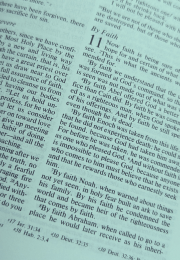WHDL - 00019112
 Visit the home page
Visit the home page
About Site Language
WHDL is viewable in multiple languages. Use the pull-down menu to select a language to view the site.
I changed my language, but I’m still seeing resources in the other languages?
If a resource or text has not been translated into your selected language, it will appear in the initially added language. We are always looking for help translating these resources. If you can help, contact us!
WHDL - 00019112


While there is little doubt that ancient cultures resorted to physical punishment in the educational process in both home and school, there is some sign in the Wisdom Literature of at least the limitations of corporal punishment as the following proverb suggests: “A rebuke goes deeper into one who has understanding than a hundred blows into a fool” (Prov. 17:10).6 Therefore, contrary to popular opinion of considering education in ancient Israel as “a harsh and mindless affair,” it is our intention in this research to demonstrate, on the basis of Proverbs 1–9, that the sages in ancient Israel seem to have held far more subtle, nuanced, and thoughtful ideas about educational process than the common picture would have it. In order to accomplish that we will attempt to show a wide span of educational methods and techniques that were used and applied by the father/teacher in the process of instruction as demonstrated in Proverbs 1–9. We will also endeavor to explore the theological assumptions permeating Proverbs 1–9 and in fact shaping the sages’ concept of education. After scrupulous exploration and observation of the pedagogical methods and their underlying theological principles, we will deduce what the sages of Proverbs 1–9 believed was the chief goal of the process of instruction offered to the young people.
CC BY-NC-ND 4.0 https://creativecommons.org/licenses/by-nc-nd/4.0/
8 Resources
2023
1925
2011
2009
2009
2013
2024
2023
2024
2025
2025
2025
2011
2008
2021
2010
2008
2006
2010
2023
2009
2008
2023
2024